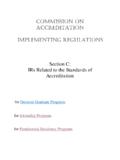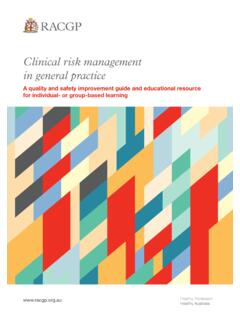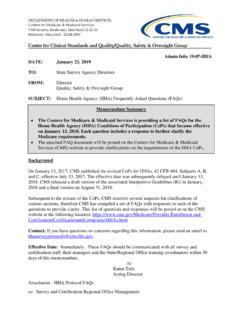Transcription of National minimum standards and core curriculum for ...
1 National minimum standards and core curriculum for Immunisation Training for Registered Healthcare Practitioners Revised February 2018 National minimum standards and core curriculum for Immunisation Training 2 About Public Health England Public Health England exists to protect and improve the nation s health and wellbeing, and reduce health inequalities. We do this through world-leading science, knowledge and intelligence, advocacy, partnerships and the delivery of specialist public health services. We are an executive agency of the Department of Health and Social Care, and a distinct delivery organisation with operational autonomy. We provide government, local government, the NHS, Parliament, industry and the public with evidence-based professional, scientific and delivery expertise and support. Public Health England Wellington House 133-155 Waterloo Road London SE1 8UG Tel: 020 7654 8000 Twitter: @PHE_uk Facebook: For queries relating to this document, please contact: (England) (Wales) (Northern Ireland) Crown copyright 2018 You may re-use this information (excluding logos) free of charge in any format or medium, under the terms of the Open Government Licence To view this licence, visit OGL or email Where we have identified any third party copyright information you will need to obtain permission from the copyright holders concerned.
2 Published: February 2018 PHE publications gateway number: 2017736 Review date: February 2023 PHE supports the UN Sustainable Development Goals National minimum standards and core curriculum for Immunisation Training 3 Acknowledgements These National minimum standards and core curriculum for Immunisation Training are a revised and updated version of the original standards published by the former Health Protection Agency in 2005. Although previously published as two separate documents, this revised document incorporates both the minimum standards and the core curriculum in one document. Substantial revisions have been made to this version by Public Health England (PHE) with invaluable support, comments and contributions from professional organisations, training providers and immunisation experts from across the UK. A wide consultation process has been carried out to ensure that the views of practitioners delivering immunisation in many different service areas have been represented.
3 The following organisations were asked for their comments: Centre for Pharmacy Postgraduate Education Community Practitioners and Health Visitors Association Department of Health England Department of Health Northern Ireland Faculty of Public Health Health Education England Institute of Health Visiting NHS Education Scotland NHS England Health and Justice NHS England Nursing Directorate NHS England Public Health Commissioning Central Team Occupational Health Heads of Department, Managers, Senior Nurses Pharmaceutical Services Negotiating Committee Public Health Agency Northern Ireland PHE Health and Justice PHE Health Protection Team members PHE Nursing Directorate PHE Screening and Immunisation Team members Public Health Wales Royal College of General Practitioners Royal College of Midwives Royal College of Nursing Royal College of Paediatrics and Child Health Royal Pharmaceutical Society School And Public Health Nurses Association Surgeon General s Department, Defence Public Health UCL Great Ormond Street Institute of Child Health The authors gratefully acknowledge the advice and recommendations they provided.
4 National minimum standards and core curriculum for Immunisation Training 4 The joint RCN/PHE documents Supporting the delivery of immunisation education ,and the Immunisation knowledge and skills competence assessment tool previously published by the RCN have both now been incorporated into this version of the National minimum standards and core curriculum for Immunisation. Intended audience Healthcare practitioners from a wide diversity of professional backgrounds now give immunisations in many different settings and service areas general practice, schools, hospitals, prisons, occupational health, maternity, neonatal and paediatric services, pharmacies, sexual health clinics, long term care settings, etc. This document sets out a recommended minimum framework for developing training to meet the needs of all registered healthcare practitioners with a role in immunisation. A separate document details the recommended training for unregistered healthcare support workers with a role in immunisation ( National minimum standards and core curriculum for immunisation training of healthcare support workers).
5 This document does not set out the processes for commissioning, procuring and delivering training. These standards have been approved for use in England, Northern Ireland and Wales. In Scotland, these standards will be mapped across to educational resources as appropriate. National minimum standards and core curriculum for Immunisation Training 5 Contents About Public Health England 2 Acknowledgements 3 Intended audience 4 Contents 5 Introduction 6 Intended users of the training standards and core curriculum 6 Why immunisation training standards and a core curriculum are needed 7 Aim and Objectives 9 Aim 9 Objectives 9 standards for Immunisation Training for registered healthcare practitioners 10 core areas of immunisation knowledge 12 Tailoring training to suit the requirements of the immunisers 13 Additional training needs 13 Provision of training 14 Updates 15 Topics to include in immunisation updates 16 Supervised practice 17 Assessment of knowledge and competence 17 Assessment of knowledge 17 Assessment of clinical competency 17 Evidence of competence 18 Training for non- clinical staff 18 Establishing training 19 Summary 19 Resources 20
6 Appendix A 22 competency assessment tool: information for users 22 How to use the competency assessment tool: 22 Appendix B 27 Suggested content for core topics to be covered in foundation immunisation training 27 Appendix C 34 An example of the standards expected when assessing practitioners for competency in immunisation 34 Glossary 35 National minimum standards and core curriculum for Immunisation Training 6 Introduction Immunisation is one of our most successful public health interventions, protecting children and adults and saving thousands of lives every year. Ensuring ongoing public and professional confidence is critical to the success of these programmes. As the incidence of vaccine preventable diseases declines due to the success of immunisation programmes, healthcare practitioners need to be able to explain why vaccinations are still so important. In a climate where frequent changes are made to the vaccine programmes and electronic media facilitates the rapid spread of any vaccine concerns or controversies, public awareness and confidence in vaccines may waver.
7 Evidence shows that healthcare practitioners are extremely important in communicating information about vaccination and are highly trusted by parents; a trust that has increased in recent years1. Both this trust, and the advice given by healthcare practitioners, appear to be key factors influencing parental decisions about immunisation1,2. A high level of knowledge and a positive attitude to immunisation in healthcare practitioners are widely acknowledged as being important determinants in achieving and maintaining high vaccine uptake3,4,5. It is therefore vital that immunisers are confident, knowledgeable and up to date. Good foundation training and regular updates must be provided and undertaken to achieve this a recommendation also made by NICE6 and the SAGE working group on vaccine hesitancy7. Intended users of the training standards and core curriculum These National training standards and core curriculum are intended to be of use to those commissioning and delivering immunisation services and training and to practitioners undertaking a role in immunisation.
8 This document sets the standards and lists the essential topics which should be incorporated into immunisation training for registered healthcare practitioners with a role in immunisation. Immunisation training providers can use this as a checklist to ensure that any training being offered or that has been undertaken is comprehensive and meets National minimum standards for content. Demonstrating that the course covers all 1 Campbell H, Edwards A et al. Changing attitudes to childhood immunisation in English parents. Vaccine. 2017 May 19;35(22):2979-2985. doi: Epub 2017 Apr 23. 2 Edwards A, Bedford H et al. Promoting influenza vaccine for children. Practice Nursing 2017;28(10):1-5 3 Zhang J, While A, Norman I. Knowledge and attitudes regarding influenza vaccination among nurses: a research review. Vaccine 2010;28(44):7207-14 4 Dub E, Laberge C et al.
9 Vaccine hesitancy: an overview. Hum Vaccin Immunother. 2013 Aug;9(8):1763-73 5 Simone B, Carrillo-Santisteve P, Lopalco PL. Healthcare workers role in keeping MMR vaccination uptake high in Europe: a review of evidence. Euro Surveill. 2012;17(26):pii=20206. 6 National Institute for Health and Care Excellence (NICE) Immunisations: reducing differences in uptake in under 19s. Public health guideline [PH21] Published: September 2009 Updated: September 2017 7 Strategic Advisory Group of Experts (SAGE) Report of the SAGE working group on vaccine hesitancy. October 2014 National minimum standards and core curriculum for Immunisation Training 7 the core topics will not assure the quality of training however, so processes should be in place to monitor quality. For those responsible for developing and delivering immunisation training, this document has been designed to ensure all core areas of immunisation knowledge and competency are covered by providing a curriculum around which to structure the training and to define the minimum level of training that should be provided.
10 It is hoped this will also promote consistency in the immunisation training offered. The curriculum is designed to be comprehensive to prepare practitioners with a role in vaccine administration. The curriculum will also be relevant to those who do not actually administer vaccines but have been designated a role in providing information and advice or supporting the delivery of the programme. Trainers should adapt the curriculum (the topics covered and the level of detail required) to the specific needs of the workforce depending on the nature of their role and the vaccine(s) they deliver. For those with a role in immunisation, these standards should help practitioners in requesting and gaining access to comprehensive training and should be seen as a useful tool rather than a barrier to practice. The re-publication of these minimum training standards does not mean that practitioners currently involved in immunisation who have not received specific training should be prevented from practising, but it is recommended that they are given the opportunity to receive comprehensive immunisation training as soon as is practically possible.

















